Is it okay to drink tea for breakfast?
Breakfast divides consumers and their habits: there are those who prefer to drink tea, and there are those who do not start the day without their coffee. If you are the Tea lovers, you cannot miss this article.
Tea in the morning — a healthy habit
It is the most widely drunk beverage in the world, after water. It comes from Chinese civilization and consists of an infusion or decoction made from the leaves of a plant called Camellia sinensis. Depending on the processing and degree of oxidation of the leaves, they are divided into different varieties, of which the most popular are black tea; green tea; oolong tea; white tea; and yellow tea.
The benefits
For a tea-friendly breakfast, here is some information. Tea is very rich in flavonoids, a group of polyphenols with potent antioxidant activity, useful in fighting free radicals and preventing aging and a range of diseases. It is also rich in an amino acid, theanine. Useful in fighting certain diseases.
It also contains a certain amount of caffeine. In fact, a 250 ml cup contains about 40 mg, roughly half the dose contained in a cup of espresso. A study presented at the European Society of Cardiology congress showed that heavy tea drinkers have a 24 percent lower risk of death from non-cardiovascular causes than those who do not drink any.
Black tea then has an important cardioprotective effect: tea drinkers have a better cardiovascular profile than those who do not drink tea. Tea also improves blood cholesterol levels, stabilizes blood sugar levels; it is draining and also helps to lose some weight. Finally, it has a protective effect against some types of cancer.
Negative effects
With tea, too, the important thing is not to overdo it, but the “limit” amount is much higher than with coffee and goes up to eight to ten cups a day. Tea is diuretic, which is good for you, but it is also astringent. It may be helpful for some, but moderation is needed for those suffering from constipation. Some caution is also required for those who are anemic: the tannins in the drink may interfere with the proper absorption of iron from plant sources. It is therefore best to take it away from meals.
